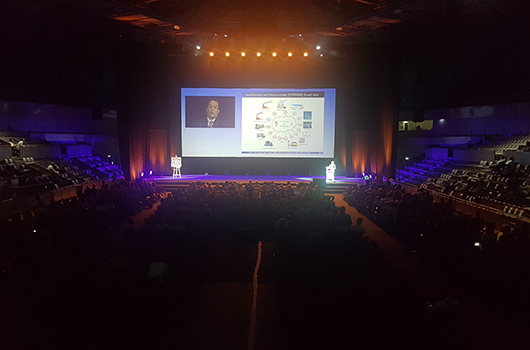 Max McGraw Endowed Chair Professor of Energy and Power Engineering and Management at Armour College of Engineering Qing-Chang Zhong delivered a semi-plenary talk titled “Synchronized and Democratized Smart Grids” at the 20th World Congress of the International Federation of Automatic Control held in Toulouse, France from July 9–14, 2017.
Max McGraw Endowed Chair Professor of Energy and Power Engineering and Management at Armour College of Engineering Qing-Chang Zhong delivered a semi-plenary talk titled “Synchronized and Democratized Smart Grids” at the 20th World Congress of the International Federation of Automatic Control held in Toulouse, France from July 9–14, 2017.
Zhong pointed out that the fundamental challenge behind the paradigm change of power systems is that future power systems will be power-electronics-based, instead of electric-machines-based, with a huge number of non-synchronous incompatible players. He then presented his vision for future power systems—Synchronized and Democratized Smart Grids—to operate power electronic converters as virtual synchronous machines (VSM). This unifies the integration and interaction of power systems players, enhancing the stability, scalability, operability, reliability, security, and resiliency of future power systems.
Zhong, a fellow of IEEE and IET, is the Max McGraw Endowed Chair Professor in Energy and Power Engineering and Management in the Department of Electrical and Computer Engineering. He is a steering committee member of IEEE Smart Grid, a distinguished lecturer of the IEEE Control Systems Society, the IEEE Power Electronics Society and the IEEE Power and Energy Society. His research focuses on control theory, power electronics, and the seamless integration of both to address fundamental challenges in energy and power systems.
IFAC, founded in Paris in September 1957, is a worldwide multinational federation tasked with promoting the science and technology of automatic control in all systems, e.g. engineering, physical, biological, social and economic systems, in both theory and applications. IFAC is also concerned with the impact of control technologies on society. The IFAC World Congress is held triennially and is the Olympics in control and systems engineering. This year it attracted 3,500 attendees from more than 80 countries.
